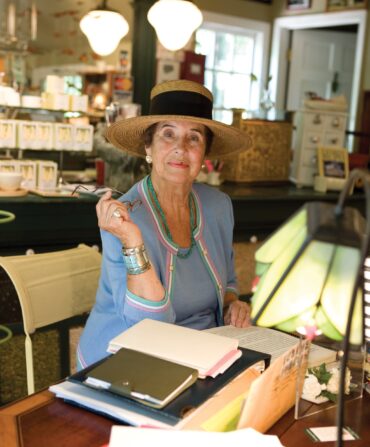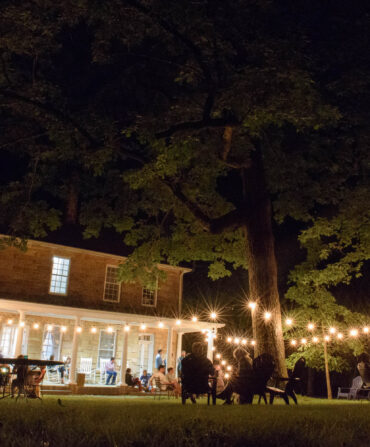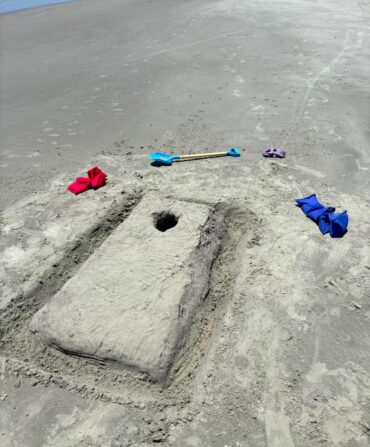As dependable as gifts from Santa and the Nativity story on Christmas mornings growing up was the phone ringing before we were barely out of bed. “Christmas gift!” my grandmother would exclaim when we answered. She lived across the street and would see us later at brunch, where she would serve ham and fresh biscuits. But she often couldn’t wait till then. She had to be the first to say, “Christmas gift!”
The tradition came from her large family, who lived in upstate South Carolina. Back then, in the 1930s and ’40s, the saying was a way to claim the first gift of the day. By the time the custom trickled down to me, there was no particular prize—just the glory of having been first. For years I didn’t question the tradition—I only knew I had to try to beat my grandmother to the saying; I would even sneak over to her house early, ring the doorbell, and, before she could answer, yell, “Christmas gift!” through the glass of the dining room window. She’d appear at the door with a big, exasperated sigh, but I always saw a twinkle in her eye. She loved that I was carrying on the ritual.

The author’s father and uncle, whose mother kept “Christmas gift” alive.
Grandma died almost two years ago, and I regret not asking her about a lot of things, including about the origins of “Christmas gift.” Was it just our family? A South Carolina thing? A Southern thing? No one else I knew seemed to do it.
I contacted a couple of Southern linguists who were unfamiliar, too. Then I was introduced to Dr. Michael Montgomery, a University of South Carolina professor emeritus of English and linguistics. Jackpot.
“I can remember [my grandfather] throwing open the door and yelling, ‘Christmas gift!’” says Montgomery, a Knoxville, Tennessee, native. “It was a pretty indelible memory, even for a small child.”
Although Montgomery says there’s no way to know the exact origin, the Dictionary of American Regional English does claim the usage is chiefly Southern, and cites alternatives such as Christmas box, Christmas give, and Christmas treat. Montgomery is putting together the Dictionary of Smoky Mountain and Southern Appalachian English, to be published in 2018, and the saying gets its own entry there, too. One of the sources he cites is Jean Thomas’s Blue Ridge Country, a 1942 look at mountain customs that offers this description: “The young folks of the community go from home to home, bursting in with a cheery ‘Christmas gift!’ Those who have been taken unaware, though it happens the same way each year, forgetting, in the pleasant excitement of the occasion, to cry the greeting first, must pay a forfeit of something good to eat—cake, home-made taffy, popcorn, apples, nuts.”
But the phrase goes back further, perhaps to 1844, when DARE says it was used in New York’s Knickerbocker magazine, though the context is unclear. Less than twenty years later, though, during the Civil War, the saying pops up in Southern soldiers’ letters. Montgomery, along with Dr. Michael Ellis at Missouri State University, is working on a project called the Corpus of American Civil War Letters, one of the most widespread efforts to transcribe and catalog missives from both sides of the conflict.
The two concentrate on letters to and from privates, or, as Montgomery says, “the letters that are most speech-like; they don’t have any punctuation; they’re full of misspellings—because so many soldiers would never have been in a schoolroom. And a lot of times, the misspellings reflect the pronunciation. So we always tell students and other folks, you have to read these letters aloud. That’s the way people handled letters 150 years ago. A letter arrived, and you called all the family together, and you read it to everybody. It was an oral experience.” As such, the University of Georgia is compiling CACWL’s work under the name the “Common Tongue Project.”
As for “Christmas gift,” says Montgomery, “I wouldn’t be surprised that that the conflict, in bringing people together, spread the expression.” Consider this December 1861 epistle:
“Dear Sisters a few lins to you as brother has Claim A Christmas gifte,” wrote L.W. Griffin, of Rutherford County, North Carolina. “I Claim one from gorge and from Joseph … you Can tell them to have it for me when I come home If I live.”
Today, though, “this is an increasingly old-fashioned expression,” Montgomery says, one that tends to run in families. Still, “I am doing what I can to propagate it with my nephews, who are all twenty-first-century children,” says Montgomery. I, too, have some nephews who will get a loud and proud “Christmas gift!” from their aunt this year. And one day, maybe, I’ll let one of them say it first.







